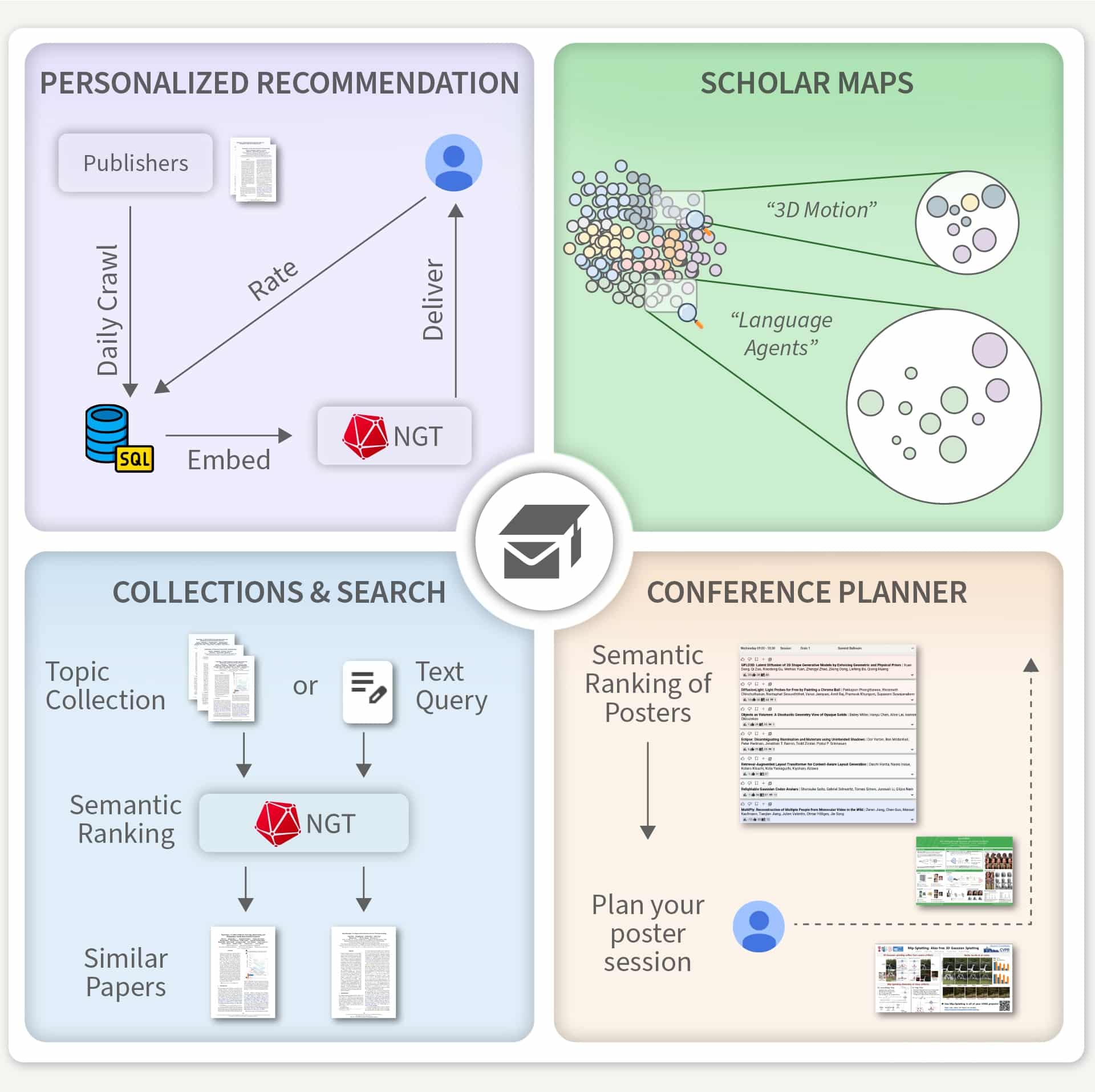How do you keep up with the flood of new scientific papers in your field? If you’re like us, you’ve probably tried Google Scholar alerts, only to find yourself drowning in duplicate paper alerts, or worse, missing crucial work published just outside your radar. In today’s fast-paced research landscape, the cost of missing a relevant paper can be high: getting scooped, duplicating existing efforts, or overlooking a breakthrough just one citation away.
That’s why we built Scholar Inbox, a platform that makes it effortless to stay up to date with the latest research, tailored precisely to your research interests.
The idea began as a small tool for our own lab at the University of Tübingen, led by Prof. Andreas Geiger. What started as a side project by a single master’s student quickly caught the attention of our colleagues. Their feedback helped us sharpen our focus on what matters most in research discovery: relevance, timeliness, and breadth. From there, the tool spread organically across the Tübingen research community, and today, Scholar Inbox serves tens of thousands of researchers worldwide – delivering daily, personalized updates from across the open-access ecosystem, including arXiv, bioRxiv, medRxiv, and many more.
Research That Finds You
What if the papers you needed found you before you even knew you needed them?
As Scholar Inbox grew beyond our lab, we faced a new challenge: how to determine the most relevant papers from the ever-expanding stream of daily publications. To solve this problem, we built a personalized recommender system that learns from user feedback. With every rating and interaction, the system adapts, refining its understanding of your research interests and delivering increasingly relevant results.
Unlike social media platforms that amplify what’s already popular, Scholar Inbox takes a fundamentally different approach. Our recommender is content-based: it analyzes the semantic features of each paper, not its citation count or how famous its author might be. This design helps avoid the so-called Matthew effect, where visibility breeds more visibility, often at the expense of emerging or underrepresented voices in science. Scholar Inbox levels the playing field: every paper is recommended based on how closely it aligns with your research interests.
As our user base grows, so does the power of the platform. By using the reactions of our users, we are able to highlight trending papers across fields, offering a window into what’s capturing the attention of the research community at large without compromising the precision of individual recommendations.

Scholar Inbox provides key tools for researchers: personalized paper recommendations, interactive science maps for exploring research across disciplines, smart paper collections, search to support literature reviews and discovery, and a conference planner to optimize time at poster and oral sessions.
Accelerating and Democratizing Scientific Knowledge
Scholar Inbox is driven by a simple conviction: scientific knowledge should be freely accessible to everyone. In a publisher-dominated environment, where many important discoveries are locked behind paywalls, we see open access not just as a convenience, but as a necessity for equitable progress.
By focusing exclusively on open-access research, Scholar Inbox empowers scientists across disciplines and geographies to stay current, independent of institutional subscriptions. Our recommender surfaces impactful work at the very moment it is released, in most cases even before peer review, ensuring that promising ideas don’t wait months to find their audience.
How We Train the Recommender
At the heart of Scholar Inbox is a recommender system that learns from user interactions. To capture the semantic meaning of scientific papers, we use a transformer-based encoder (GTE) to convert each title and abstract into a high-dimensional vector. These embeddings allow us to compare papers not by keyword overlap or citation count, but by their actual content.
We generate embeddings for the more than 3 million papers in our database, along with every new submission from arXiv, bioRxiv, medRxiv, ChemRxiv, and major conference proceedings. For each user, we train a personalized classification model that distinguishes between papers they’ve rated positively or negatively. What makes this task especially challenging is that most negative feedback is given to papers that are shown to a user by Scholar Inbox, i.e. papers that are already semantically close to a user’s interests.
To train the model effectively, we introduce a mix of “easy” negatives – papers randomly sampled from the broader database – to help the model learn a better decision boundary that respects both easy and hard negative samples. And because users interact with different numbers of papers, often with imbalanced labels, we deploy a weighted loss function that compensates for the uneven distribution of feedback. This ensures that the model learns what’s meaningful to each user. For a detailed description on how we train the recommender and which design choices are important for accurate recommendations, please refer to our research paper.
The result? A system that continuously evolves via nuanced signals to deliver precise, personalized recommendations. Users of our system receive a personal paper digest that lists the few most relevant papers from over 1000 newly published papers every day. The digest itself can be customized to cover larger periods or to inform the user via email about new papers.
Charting the Landscape of Science
What if navigating science felt more like exploring a map than scrolling through a feed?
To help researchers step back and see the bigger picture, we have also built Scholar Maps – an interactive, two-dimensional visualization of scientific literature, covering all fields of science. Using t-SNE projections of semantic embeddings for over 3 million papers, we reveal the structure of science as a navigable landscape. Papers that are semantically similar are positioned close together, forming organic clusters that mirror real-world research communities and themes.
However, a map is only useful if you are able to read and navigate it. That’s why we use large language models and established scientific taxonomies to hierarchically label clusters of scientific work. As users zoom in, the visualization dynamically loads more detail, much like navigating Google Maps.
We believe that Scholar Maps is more than just a curiosity, it’s a tool that might change the way we discover new research in the future. For those who want to explore without signing up, a public demo is available at www.scholar-maps.com.
Your Personal Library of Science and Conference Planner
But that’s not all. To help you focus on your main interests and minimize organizational work, we’ve added even more features to Scholar Inbox. Organizing your literature review has become not just easier, but also smarter. On Scholar Inbox, users can create collections to group papers around specific research topics or projects. Our recommender system can automatically suggest additional papers that match the semantic footprint of a collection, helping you expand your understanding of a topic from just a few starting points.
Navigating large scientific conferences can be overwhelming – our personalized conference planner helps researchers cut through the noise. In close collaboration with conference organizers, we are able to provide structured timetables tailored to each attendee. Based on your interests, our system highlights the most relevant posters and talks, helping you prioritize your time effectively. This feature has already supported some of the largest conferences in computer science, including CVPR, NeurIPS, ECCV, ICML, and ICLR, and we’re continuously expanding to other disciplines. If you are organizing a large conference yourself, we are happy to hear from you and to collaborate!
Join the Scholar Inbox Community
Scholar Inbox is more than a tool – it’s a growing community of researchers committed to open access, intelligent discovery, and the free exchange of knowledge. Our platform is designed to keep scientists informed, curious, and connected across disciplines.
Whether you’re just starting your academic journey or leading a research group, we invite you to be part of our grass-roots effort. Try our platform, explore new fields, and let us know how we can improve. The most valuable feedback is often provided to us by our Scholar Inbox community.
Original publication: Markus Flicke, Glenn Angrabeit, Madhav Iyengar, Vitalii Protsenko, Illia Shakun, Jovan Cicvaric, Bora Kargi, Haoyu He, Lukas Schuler, Lewin Scholz, Kavyanjali Agnihotri, Yong Cao, Andreas Geiger. 2025. Scholar Inbox: Personalized Paper Recommendations for Scientists. In Proceedings of the 63nd Annual Meeting of the Association for Computational Linguistics (Volume 3: System Demonstrations), Vienna, Austria. Association for Computational Linguistics. https://doi.org/10.48550/arXiv.2504.08385
Cover illustration: Franz-Georg Stämmele

How AI Affects Our Everyday Lives


Comments